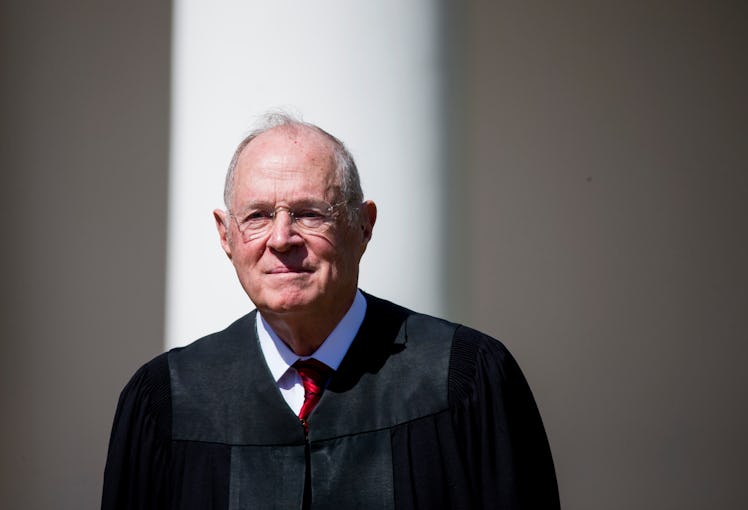
This Is How The Next Supreme Court Justice Will Get Appointed
On Wednesday, June 27, Supreme Court Justice Anthony Kennedy announced he would retire at the end of July. Now, the duty of selecting a new justice falls to President Donald Trump, who will replace Anthony Kennedy on the Supreme Court with a new nominee. That nominee is set to become the second Supreme Court pick of Trump's presidency.
The first of those picks was Neil Gorsuch, the conservative judge whom Trump nominated to the court in late January 2017, days after the president's inauguration. Gorsuch was selected to replace late Supreme Court Justice Antolin Scalia, who died during the last 12 months of President Barack Obama's tenure.
Following Scalia's death, Obama's nominated Merrick Garland, a federal judge who was denied a confirmation hearing in the Republican-controlled Senate. The denial of a hearing lasted until the end of the Obama presidency, paving the way for Trump to inherit the selection of Scalia's replacement following the 2016 presidential election.
With the Senate still under a Republican majority until at least January 2019, no such delay will occur this time around.
In a letter announcing his retirement, Justice Kennedy listed July 31 as the effective date of his retirement.
"For a member of the legal profession, it is the highest of honors to serve on this Court," Kennedy wrote in the letter, addressed to the president. "Please permit me by this letter to express my profound gratitude for having had the privilege to seek in each case how best to know, interpret and defend the Constitution and the laws that must always conform to its mandates and promises."
After July, Senate Majority Leader Mitch McConnell will be set to hold a confirmation hearing to confirm Trump's yet-to-be-determined nominee.
On Wednesday, Trump said that his nominee will come from a previously released list of candidates that was first revealed during the presidential campaign, and has since been updated multiple times. It now includes 25 names.
The confirmation will require a simple majority of members in the Senate to vote in favor of the nominee. Republicans currently occupy 51 Senate seats, to the Democrats' 49. In the event of a 50-50 split during the confirmation hearing, Vice President Mike Pence would cast the tie-breaking vote.
Previously, Supreme Court nominations required a majority of at least 60 votes to receive confirmation. That changed, however, in 2017 when Majority Leader McConnell invoked what is called the "nuclear option," a drastic changing of long-followed Senate rules that required the 60 votes, shifting the threshold to 50 votes.
That McConnell opted for the nuclear option reflected the contentious politics at play. The majority of Democrats had no intentions to vote for a nominee to occupy what they regarded a "stolen" seat.
In response, the GOP Senate changed the rules.
"Harry Reid decided that executive nominations will be done by simple majority, and we just simply went with the Harry Reid rule today," Kentucky Sen. Rand Paul said at the time. "I don't think this is any different from what he put forward."
Paul was referring to now-retired Nevada Sen. Harry Reid, who in 2013 invoked the nuclear option in a different scenario, changing the rules for the amount of votes needed to confirm a member of the executive branch.
Fast forward five years later, and a Republican president is now set to nominate a second Supreme Court judge to a lifetime appointment for the second straight year, a fact which underlines the unique implications of the 2016 presidential election.
Kennedy has long been regarded as a swing vote in the Supreme Court, one who on any given decision could side with the four justices thought of as decidedly liberal, or the four others regarded as conservative.
Now, after the announcement of his retirement, President Trump has the opportunity to cement a truly conservative majority for years to come.